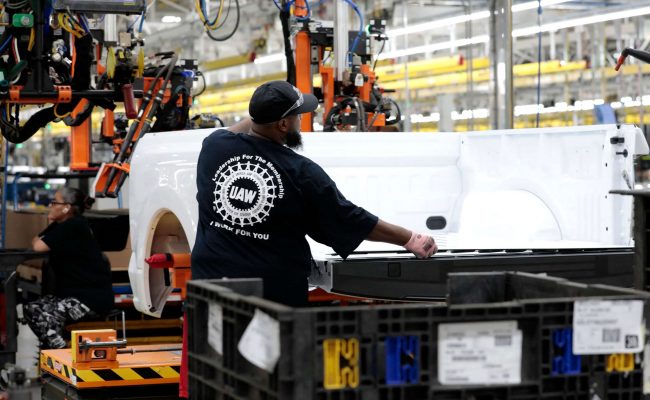Workers start strike at US motor industry giants
- Posted on
- Comment

More than 10,000 staff at three of biggest US carmakers have started strike action, their union says.
Work has been stopped at three plants owned by General Motors (GM), Ford and Stellantis.
It came after labour contracts expired on Thursday night. The United Autoworkers Union (UAW) said the firms had not put forward acceptable offers.
The fight threatens to trigger higher prices for buyers and major disruption for the motor industry giants.
The UAW’s president Shawn Fain told the BBC it was now up to the companies to resolve the dispute.
“When they start taking care of their workers it will end,” he said.
The strike started at midnight eastern time (04:00 GMT) at GM’s Wentzville, Missouri mid-size truck plant, Ford’s Bronco plant in Michigan and the Jeep plant in Toledo, Ohio owned by Stellantis.
The plants are critical to the production of some of the “Detroit Three’s” most profitable vehicles.
Other facilities will continue to operate, the UAW said but it did not rule out broadening the strikes beyond the initial three targets.
With the deadline looming on Thursday, the White House said that President Joe Biden had spoken on the phone with Mr Fain about the negotiations but provided no further details.
The union had sought a 40% pay increase for its roughly 140,000 members over four years, noting a comparable rise in pay for company leaders.
The UAW’s proposals would more than double its US labour costs, Ford said in a statement.
Last month, 97% of the union’s members voted to authorise a strike.
Workers said the companies could afford to be more generous after years of record profits.
“In my opinion we are owed this,” said Paul Raczka, who works in a Stellantis factory in Michigan making Jeep Grand Cherokees.
The fourth generation in his family to work in the industry, Mr Raczka said such jobs, which came with good healthcare and secure pensions, had provided an “awesome living” for his parents – a way of life that no longer feels possible today.
The 31-year-old said he could not even afford to buy the car he makes.
“We are still sitting on the backburner while these CEOs are making, you know, upwards of $20m a year,” he said.
Jim Farley, chief executive of Ford, told reporters earlier this week that he hoped to avoid a strike but there was a limit to what the company was willing to concede.
“We have to protect the sustainability of the company,” he said.
A 10-day strike could the three firms nearly $1bn (£800m) and workers almost $900m in lost wages, according to estimates by the Anderson Economic Group. It said the total hit to the economy could amount to more than $5bn.
Tyler Theile, vice-president at the firm, said a stoppage would have to be “pretty lengthy to move the needle on national economic indicators.”
Coming into the strike, the supply of cars, which has been strained since the parts shortages of the pandemic, remains far lower than it has been in the past.
Analysts said that could also mean a prolonged walkout leads to higher prices for buyers.
Ford, GM and Stellantis together account for about 40% of US car sales, though their share has dropped sharply over the last quarter of a century, as foreign firms such as Toyota make inroads.
The last time the car industry faced a strike was in 2019, when workers at GM walked off the job for six weeks.
GM worker Jessie Kelly, who participated in that walkout, said she had been trying to save up in anticipation of another stoppage.
UAW participants are due to receive $500 in weekly strike benefits from the union, but that would still be significantly less than her wages, she said.
“My strike bills will not cover my mortgage, let alone the grocery bills, let alone the lights and the everything else. So it is gonna definitely be a struggle,” she said.
Ms Kelly, who lives near Detroit, said she supported the fight, despite the costs, noting that her pay has not kept pace with rising prices and is quickly eaten up by childcare and housing expenses. The 33-year-old said she had just two weeks of holiday a year, which she was typically forced to use for emergencies.
“At the end of the day, we all want to work for a corporation that is making good money. We just want our fair share of that,” she said.
“The CEOs are gonna keep paying themselves more and more money and we’re the only ones being left behind.”
-BBC






 (Selorm) |
(Selorm) |  (Nana Kwesi)
(Nana Kwesi)